A resistance movement is an organized group of people that tries to resist the government or an occupying power, causing disruption and unrest in civil order and stability. Such a movement may seek to achieve its goals through either the use of violent or nonviolent resistance, or the use of force, whether armed or unarmed. In many cases, as for example in the United States during the American Revolution, or in Norway in the Second World War, a resistance movement may employ both violent and non-violent methods, usually operating under different organizations and acting in different phases or geographical areas within a country.

Yevhen Mykhailovych Konovalets was a Ukrainian military commander and political leader of the Ukrainian nationalist movement.
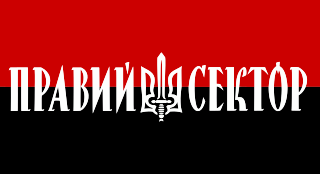
Right Sector is a loosely defined coalition of right-wing to far-right Ukrainian nationalist organizations. It originated in November 2013 as a right-wing, paramilitary confederation of several ultranationalist organizations at the Euromaidan revolt in Kyiv, where its street fighters participated in clashes with riot police. The coalition became a political party on 22 March 2014, at which time it claimed to have roughly 10,000 members. Founding groups included the Trident (Tryzub), led by Dmytro Yarosh and Andriy Tarasenko, and the Ukrainian National Assembly–Ukrainian National Self-Defense (UNA–UNSO), a political and paramilitary organization. Other founding groups included the Social-National Assembly, and its Patriot of Ukraine paramilitary wing, White Hammer, and the Sich Battalion. White Hammer was expelled in March 2014, and Patriot of Ukraine left the organization, along with many UNA–UNSO members, in the following months.

Russian separatist forces in Ukraine, primarily the People's Militias of the Donetsk People's Republic (DPR) and the Luhansk People's Republic (LPR), were pro-Russian paramilitaries in the Donbas region of eastern Ukraine. They were under the overall control of the Russian Federation, and were also referred to as Russian proxy forces. They were active during the war in Donbas (2014–2022), the first stage of the Russo-Ukrainian War. They then supported the Russian Armed Forces against the Ukrainian Armed Forces during the 2022 Russian invasion. In September 2022, Russia annexed the DPR and LPR, and began integrating the paramilitaries into its armed forces. They are designated as terrorist groups by the government of Ukraine.
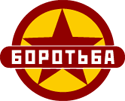
The Association "Struggle" was a Stalinist organization operating in Odesa, Kharkiv, Kyiv, and Dnipro in Ukraine.

The Social-National Assembly (SNA) was an assemblage of the ultra-nationalist radical organizations and groups founded in 2008 that share the social-national ideology and agree upon building a social-national state in Ukraine. It is located on the far right of the Ukrainian politics and built around the "Patriot of Ukraine". In late November 2013, both the S.N.A. and the "Patriot of Ukraine" entered in an association with several other Ukrainian far-right groups which led to the formation of the Right Sector.As of 2014, the S.N.A. was also reported to be close to Svoboda, and Yuriy Zbitnyev, the leader of the nationalist political party "Nova Syla". As of 2014, the S.N.A.'s activities were largely Kyiv-based.
During Ukraine's post-Soviet history, the far-right has remained on the political periphery and been largely excluded from national politics since independence in 1991. Unlike most Eastern European countries which saw far-right groups become permanent fixtures in their countries' politics during the decline and the Dissolution of the Soviet Union in 1991, the national electoral support for far-right parties in Ukraine only rarely exceeded 3% of the popular vote. Far-right parties usually enjoyed just a few wins in single-mandate districts, and no far right candidate for president has ever secured more than 5 percent of the popular vote in an election. Only once in the 1994–2014 period was a radical right-wing party elected to the parliament as an independent organization within the proportional part of the voting: Svoboda in 2012. Since then far-right parties have failed to gain enough votes to attain political representation, even at the height of nationalist sentiment during and after Russia's annexation of Crimea and the Russo-Ukrainian War.
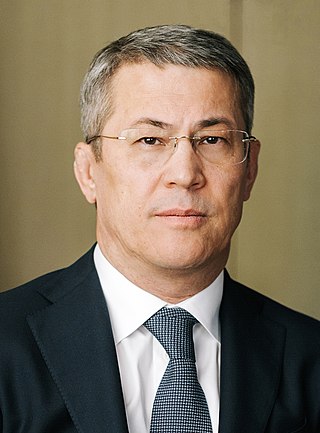
Radiy Faritovich Khabirov is a Russian politician and statesman. He is the current Head of the Republic of Bashkortostan since 11 October 2018; he is also the Candidate of Law, Honored Lawyer of the Republic of Bashkortostan. He is a member of Putin's United Russia.

The Russian invasion of Ukraine, that began on 24 February 2022, has had a significant impact on women across Ukraine and Russia, both as combatants and as civilians. In Ukraine, the invasion has seen a significant increase in women serving in the military as well as a significant number of women leaving the country as refugees. In Russia, women have led the anti-war movement.

Bashkiria, also called Bashkortostan, Bashkurdistan, Lesser Bashkiria, or Autonomous Bashkiria, was a short-lived autonomous state which existed from 1917 to 1919, during the Russian Civil War. Aligned with the Russian State, Bashkiria was attacked and later annexed by the Russian Soviet Federative Socialist Republic, leading to its 1919 collapse and succession by the Bashkir Autonomous Soviet Socialist Republic.
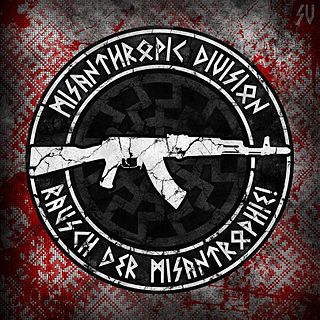
The Misanthropic Division, also known as Division Phoenix since 2016, is an international neo-Nazi group based in Ukraine which has been described as a paramilitary organization, or as a movement. They originated in 2014 to take part in the Euromaidan protests against the government of Viktor Yanukovych, with some members later fighting alongside the Azov Battalion and UAF in the Donbas region against Russian-backed separatists. Chapters of the group have also been reported to exist in other countries. According to researcher Natalia Yudina, it is not a centralized organization, and it has neither a rigid structure nor permanent leaders.

Separatism in Russia refers to bids for secession or autonomy for certain federal subjects or areas of the Russian Federation. Historically there have been many attempts to break away from the Russian Empire and the Soviet Union but modern separatism took shape in Russia after the Dissolution of the Soviet Union and the annexation of Crimea. Separatism in modern Russia was at its biggest in the 1990s and early 2000s. The topic became relevant again after the 2022 Russian invasion of Ukraine. The primary causes of separatism are nationalism in the republics, economic dependency, and geographic isolation.The promotion of separatism is illegal in Russia.
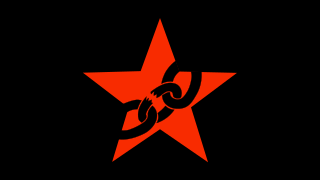
The Combat Organization of Anarcho-Communists is a militant anarcho-communist organization in Eastern Europe, part of the Belarusian and Russian partisan movement. It aims for social revolution and a libertarian socialist society. Since the start of the 2022 Russian invasion of Ukraine, it has sabotaged railway infrastructure in Russia and Belarus, as well as attacking Russian military commissariats and telecommunications. According to The Insider, the group has become "the most active 'subversive' force" in Russia since the war began.

Pro-democratic and pro-Ukrainian partisan movements have emerged in Belarus and Russia following the Russian invasion of Ukraine, a major escalation of the Russo-Ukrainian War. These resistance movements act against the authoritarian governments of Alexander Lukashenko in Belarus and Vladimir Putin in Russia, as well as against civilian supporters of these authorities and the armed forces of both countries, with the aim of stopping the war.
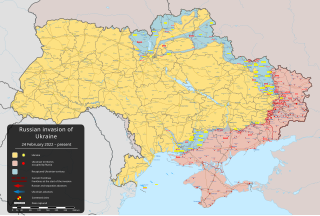
The following outline is provided as an overview of and topical guide to the Russo-Ukrainian War:
The Bashkir liberation movement is a series of military clashes and uprisings of the Bashkir people against the Russian Empire that colonized Bashkortostan, as well as protests and rallies against the policies of the Russian Federation.
Fail Fattakhovich Alsynov is a Bashkir nationalist and local political activist known for his advocacy for nature protection, ethnic identity, and language preservation in Bashkortostan.
The 2024 Bashkortostan protests are a series of protests started on 15 January 2024 beginning in the Republic of Bashkortostan, Russia, sparked by the authorities initiating a criminal case against the Bashkir environmental activist Fail Alsynov, who was subsequently sentenced to four years in prison. This led to demonstrations in the town of Baymak, where at least 1,000 Bashkir protesters assembled. The protests resulted in clashes with the riot police, who in response deployed tear gas and batons against the protesters. The protests spread into the regional capital of Ufa on 19 January, where 10 people were arrested in response.
Ruslan Salavatovich Gabbasov is a Bashkir activist, one of the leaders of the Bashkir national movement abroad, founder of the Bashkir National Political Center and Bashkort. Leader and speaker of the Free Nations of Post-Russia Forum.















